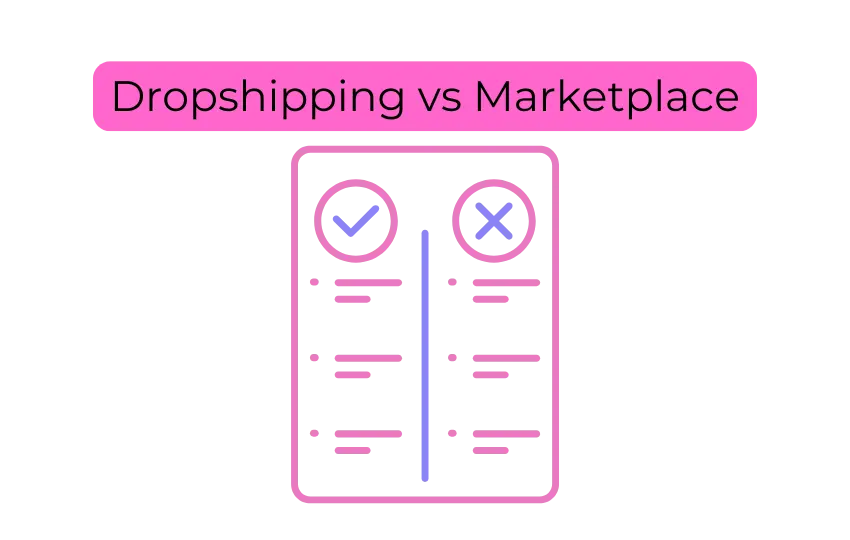Dropship vs Marketplace: Which One Is Right for You?
Dropship vs Marketplace: Learn the differences, benefits, and best choice for your business. Maximize profits and automate for success in 2025!
Jack Franklin
Dropshipping Expert

Dropship vs marketplace—this is a crucial decision for anyone stepping into the world of eCommerce. If you’re planning to start an online business, understanding these two models can determine your long-term success. Both offer unique benefits, but they also come with challenges. The key is knowing which one aligns with your goals. Let’s break down the differences and help you make an informed choice.
Dropship vs Marketplace: Understanding the Core Difference
The biggest contrast in the dropship vs marketplace debate comes down to inventory management. Dropshipping allows you to sell products without keeping stock. Instead, when a customer places an order, your supplier ships it directly to them. This eliminates upfront costs, reduces risks, and gives sellers the flexibility to operate without warehouses.
A marketplace, on the other hand, is a selling platform like eBay, Amazon, or Walmart Marketplace where multiple vendors list products. While these platforms bring instant exposure, sellers often deal with fulfillment, customer service, and platform fees. The marketplace controls most aspects of selling, including pricing policies and account rules, making it harder for sellers to build independent brands.
Dropshipping Works Without Holding Inventory
One of the biggest advantages of dropshipping is that sellers never have to buy stock upfront. Instead, they list products in their store, and when a customer places an order, the supplier ships it directly. This business model eliminates the risk of unsold inventory and allows for flexible product testing.
This is where the dropship vs marketplace comparison gets interesting. Dropshipping lets you test products without financial risk, whereas a marketplace requires inventory investment upfront. If a product doesn’t perform well, dropshipping sellers can switch to another item without losing money.
Marketplaces Provide Instant Traffic but High Competition
Selling on a marketplace means tapping into an existing audience of millions of shoppers. However, competition is fierce, and marketplace policies can change at any time. Sellers must follow strict guidelines, and price wars can drive down profits, making it harder to stand out.
In the dropship vs marketplace discussion, marketplaces win in terms of instant visibility, but they lack flexibility. Dropshipping, on the other hand, allows sellers to build an independent brand while controlling product selection and pricing.
Profit Margins Differ Between Dropshipping and Marketplaces
Dropshipping typically has lower profit margins since sellers rely on third-party suppliers. In contrast, marketplace sellers may achieve higher profits by buying products in bulk and controlling fulfillment. However, marketplaces charge listing and transaction fees, which can eat into earnings.
When comparing dropship vs marketplace models, sellers must consider long-term profitability. Dropshipping may start with thinner margins, but brand-building and smart pricing strategies can improve profitability over time.
Dropship vs Marketplace: Pros and Cons for eCommerce Sellers

Both models offer advantages and disadvantages. Dropshipping is an excellent choice for those who want low-risk entry into eCommerce. Since there’s no need to purchase inventory upfront, it’s a cost-effective way to start. However, profit margins can be thinner, and you’ll be responsible for customer service, even though suppliers handle fulfillment.
Marketplaces provide instant traffic, making it easier to get sales quickly. Platforms like Amazon and Walmart attract millions of buyers, reducing the need for marketing. However, sellers must follow strict guidelines, compete with thousands of others, and pay high fees. Marketplaces also come with risks such as sudden account suspensions or policy changes that can impact sales overnight.
Dropshipping Requires Effective Supplier Management
The success of a dropshipping business depends on reliable suppliers. Poor communication, slow shipping times, or stock shortages can lead to negative customer experiences. Choosing suppliers with fast fulfillment and quality products is crucial for long-term success.
This is where the dropship vs marketplace debate takes a turn. Marketplaces provide structured fulfillment options, like Amazon FBA or Walmart Fulfillment Services, ensuring fast delivery. However, they also charge higher fees, reducing seller profits.
Marketplaces Restrict Seller Control Over Branding
Unlike a standalone store, selling on a marketplace means following strict branding guidelines. Sellers cannot personalize packaging, add marketing inserts, or collect customer emails. This limits customer retention strategies and makes it harder to build a loyal customer base.
Although a marketplace may seem like an easier option, dropshipping offers long-term benefits. Dropshipping vs. a marketplace is not just about profits—it’s also about brand identity. Owning an independent store allows sellers to create a unique brand experience that customers remember.
Marketplace Automation Tools Improve Order Processing
Managing a marketplace store requires efficiency. Using automation tools like CrazyVendor.io can streamline tasks such as bulk listing, order fulfillment, and customer communication. Automation reduces manual work, helping sellers stay competitive.
For those weighing dropship vs marketplace, automation can make a significant difference. While marketplaces demand strict operational processes, dropshipping gives sellers more flexibility. However, using the right tools for both models is essential for scaling effectively.
Why Dropshipping Is Ideal for Independent Sellers
For those looking to build a long-term brand, dropshipping offers more control. Sellers can operate their websites, manage branding, and set their own prices. A non-API dropshipping tool like SuperDS makes listing products on platforms like eBay even safer by preventing the restrictions that API-based tools can trigger. This approach allows sellers to scale without worrying about account limitations.

Dropshipping Gives Freedom to Set Pricing Strategies
Unlike marketplaces where pricing is often controlled by algorithms or competition, dropshipping allows full pricing control. Sellers can test different pricing strategies and adjust margins without being undercut by marketplace competitors.
One of the key advantages in the dropship vs marketplace debate is freedom. Dropshipping businesses can set their own policies, marketing strategies, and customer interactions without platform interference.
Branding Is Stronger With a Dropshipping Business
Owning an independent dropshipping store means full control over branding, design, and marketing. Sellers can run email campaigns, build customer loyalty, and create a long-term brand identity—something that’s difficult to achieve in a marketplace.
The dropship vs marketplace decision should also consider branding power. Dropshipping allows for creative marketing, while marketplace sellers must work within platform rules. This is a major advantage for those looking to establish a unique brand.
Dropshipping Reduces Dependence on Platform Policies
Marketplaces frequently change policies, and sellers risk account suspensions without warning. Dropshipping on an independent store removes this uncertainty, allowing sellers to focus on growing their business without being at the mercy of third-party rules.
In the dropship vs marketplace debate, security is a crucial factor. With dropshipping, business owners are not vulnerable to sudden changes in marketplace policies that could wipe out their stores overnight.
Conclusion
Choosing between dropship vs marketplace depends on your business goals. If you want to build an independent brand with full control, dropshipping is the better choice. However, if you're looking for instant traffic and faster sales, a marketplace may be the right fit. Both have their pros and cons, but understanding the differences will help you make the best decision for long-term success.
Ready to start your dropshipping business with a non-API lister? SuperDS makes it easy to list products safely while avoiding marketplace restrictions.
Start scaling your business today!